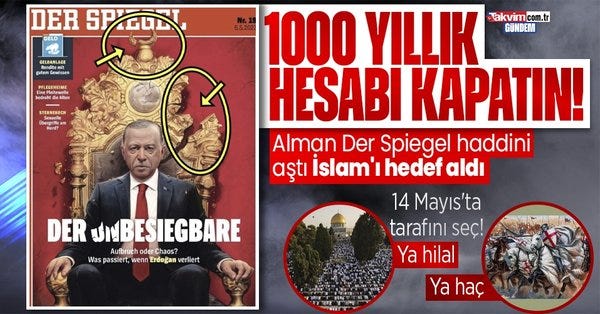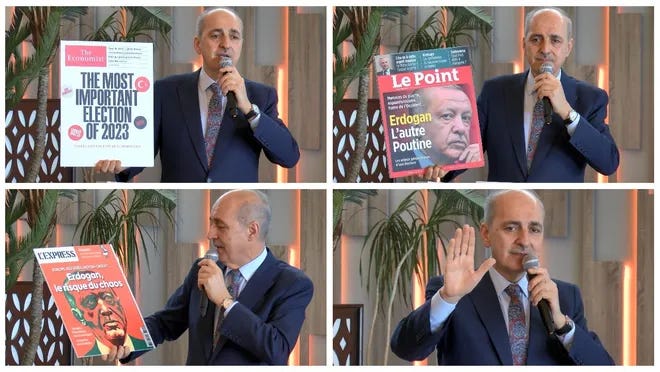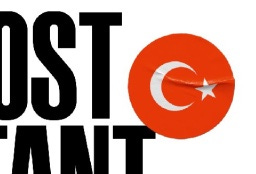The Meddlesome Western Press
Should foreign outlets censor themselves when covering elections in Turkey?
It’s election day. I’ll have more election analysis coming soon. Right now I’d like to touch on something else.
One of the issues leading up to the first round of the elections was the Western media’s tacit or open endorsement of the opposition. Many of the most prestigious outlets like The Economist and Der Spiegel understandably made the elections their cover story. In some cases, this included cover art depicting Erdoğan as an oriental despot (a thread going back at least to European depictions of Abdülhamid II, a.k.a. “the Red Sultan.”)

I’ve long argued that the core of the Erdogan regime is existential resentment of the West. This is the feeling that combined its various ideologies as well as its social and economic strata. In this metanarrative: terrorists = the West = domestic opposition = decadence. A sizable chunk of their electoral campaigns are simply about going up and down this equation in different ways. They have used white supremacist messages in the West, as well as mainstream liberal opposition against Erdoğan, as proof that the West is out to get them.
So when the regime is the locus of Western attention in this way, they don’t handle it very well. They ascribe awesome powers to the Western media, arguing that its endorsement is a form of psychological warfare aimed at toppling them. They argue that such endorsements will be met with the fury of the Turkish voter, who see through the “games” and will continue voting for Erdoğan all the more fervently. I won’t describe these views at length, but for a fleeting window into this argument, you can read this Yusuf Kaplan piece on the subject, or read Burhanettin Duran’s call on the opposition to tell the Western media to “shut their mouths.” These pieces are directly translated from their Turkish originals.
Believe it or not, they also represent the creme of the crop. Most of the “analysis” on Western media coverage of Turkish elections is so primitive that fails to go beyond the images of the stories in question.

In this election, of course, hopes were higher on the opposition front, which was reflected in enthusiasm in Western coverage, and which then resulted in a more furious reaction on the regime front.
Observing this dynamic, some people who cover Turkey for English-language outlets have cautioned against making endorsements on Turkey (David Lepeska and I had a Twitter exchange on this. I promised to respond to him at length, and here it is.) They argue that it’s only carrying grist to Erdoğan’s mill. I suspect that’s why The Economist’s cover has been much more tame to some of the media in France and Germany.
My stance on this has long been that it doesn’t matter. Erdoğan’s people are going to frame the race as being against Western powers, they’ll obsess about Western media coverage, and there’s nothing anyone can do about that. As depicted above, Deputy AK Party chairman Numan Kurtulmuş took to the airwaves to say that The Economist’s cover was especially notorious. He argued that it was a “psychological operation” that must have taken weeks to prepare. In one appearance, he focuses on the depiction of a Turkish flag button:
They put a Turkish flag here, but running through the middle of it is a crease, a fracture - a very important detail. This is carefully worked. You can attain any kind of meaning here…
I still don’t think it matters electorally, but for the sake of argument, let’s assume that it does. Let’s assume that it adds a few points to the Erdoğan vote. Should we tell the liberal press in the West to tone it down?
Let’s be clear about what this would entail. We are talking about those of us in Turkey who sympathize with the opposition reaching out to Western editors to tell them that our fellow citizens are of a delicate mental state, that they conflate media endorsements with meddling in democratic processes, and to please refrain from expressing any preference, or even opinion, on the outcome of Turkey’s elections.
And let’s assume for a second that those outlets actually do this. What will we have achieved? We’ll actually have enlisted the aid of foreign media outlets in the opposition’s campaign. We’ll have denigrated our electoral process. We’ll have told the Western world - much of which still consists of our treaty allies - that our fellow citizens cannot be trusted to navigate the modern information space. How pathetic would that be?
I could think of many, many different reasons as to why this wouldn’t work. I’m saying that even if it did, I’d object to this purely on the grounds of taste and decency.
Having said all that, there are historical reasons why this is an issue. Much of this kerfuffle comes from people whose formative political experiences are from the 1990s and early 2000s, the era of liberal interventionism. It’s true of course, that the headlines of The New York Times or the cover of The Economist have pointed the finger at places like Kosovo, Iraq and Afghanistan that saw Western military intervention. Turkey’s Islamists were alarmed by this trend, especially because it resulted in an enlarged American footprint in the Middle East and Central Asia.
As they ceaselessly point out, however, times have changed. There is no reason to ascribe such power and prestige to Western media outlets. As far as I can tell, editors in Western capitals want coverage on issues important for their countries’ interests - refugee flows, defense commitments, “business friendly” environments - and often frame that in language on democracy and human rights. In new Turkish media, and I suspect in Chinese, Indian, and Russian media, national interest weigh a bit heavier than the normative agenda, but the structure is essentially the same. I started my career in pro-government media in Turkey, and know the burning envy with which Turkish editors regards Western outlets.
These are structural issues and they deserve serious treatment. Self-censorship to preempt reactionary propaganda won’t fix anything.
I leave you with the following cartoon:





